
James Hansen: A letter to Boris Johnson
With the UK hosting the next round of climate talks, the prime minister needs to lead.
The UK will host the next round of United Nations Climate talks November in Glasgow. Young people are fed up with empty words and inaction on climate change – and rightfully so.
Prime Minister Boris Johnson has a choice.
He and other higher-ups leading the climate talks can offer soothing ambitions while continuing business--as-almost-usual – in which case global emissions will rebound after COViD and remain high or even grow – and be vilified in the streets of Glasgow, London and around the world.
Or Johnson can use his emergent humanity to help turn the world onto a different path, one dictated by science. The UK, where the industrial revolution and coal burning began, could now provide the blueprint by which other nations may proceed.
What follows is a letter former NASA scientist James Hansen sent Wednesday to the Prime Minister, urging him to pick the latter path. Science, Hansen says, shows that fossil fuel use will be phased out rapidly via a rising carbon fee with all funds distributed uniformly to the public. The effect is anti-regressive, as most wealthy people have a large carbon footprint. Seventy percent of the people come out ahead. Fee & dividend is a base that aids all other carbon policies.
The UK (like the U.S.) is five times more responsible for global warming than the average nation, Hansen notes. With strong leadership, the UK parliamentary system is capable of adopting such a science-based system this year. Just as the industrial revolution moved from the UK to the U.S., so too could a proper way to put a price on carbon. The Prime Minister has the opportunity to earn a special place in history and the gratitude of young people.
Let's see, Hansen asks, if he can grasp it.
A letter to the Prime Minister
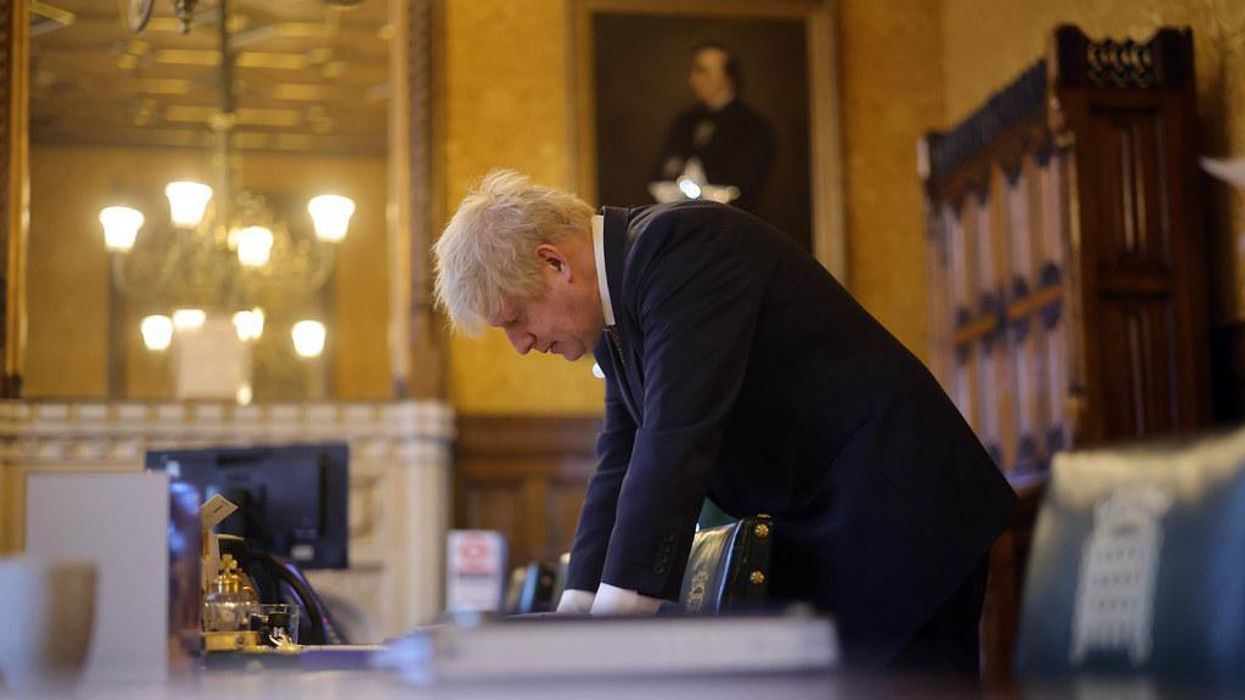
Prime Minister Boris Johnson prepping for PMQs in his House of Commons Office.
Andrew Parsons / No 10 Downing Street
February 3, 2021
Dear Prime Minister Johnson,
I write nine months prior to the 26th Conference of Parties, with much at stake for the young people of the United Kingdom and every community suffering the ravages of the climate and ecological emergency. Increase in disease, drought, fire and flood stemming from recent climate-induced events and trends foretell much worse to come. Unless bold political leaders set a new course for our home planet.
Prime Minister Johnson, young people are fed up – and for good reason. They demand that political leaders follow the science and take the actions needed to preserve and restore a healthy climate. If this COP is like the prior ones – with soothing words and worthless ambitions – they will be justifiably outraged.
In leading the UK, as host to the COP, you have a chance to change the course of our climate trajectory, earning the UK and yourself historic accolades – or you can stick with business-almost-as-usual and be vilified in the streets of Glasgow, London, and around the world.
It would be easy to achieve this latter ignominy and humiliation. Just continue with the plan to open a new coal mine in Cumbria and continue to invest funds of the British public in fossil fuel projects overseas, in contemptuous disregard of the future of young people and nature.
The contrary path is not so easy, but, with your leadership, it is realistic. And by providing the acumen and gumption required to change our course, you will earn a special place in history and the gratitude of young people.
The science must be followed
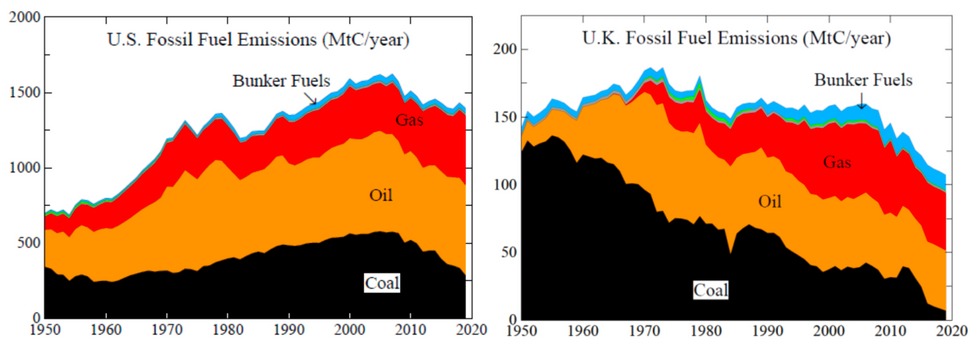
U.S. versus UK fossil fuel carbon emissions, in megatons of carbon per year
The science that must be followed is clear, not forbidding, and not in dispute among the experts. It is feasible to explain to the public what must be done and to persuade your Parliament. The great obstacle you must overcome – where others have failed – is that posed by the special financial interests that have bribed our governments and trashed our planet.Some background information clarifies the science.
Recently, in reviewing UK progress in reducing fossil fuel emissions, I noted that your national emissions declined by 30 percent between 1997 (year of the Kyoto Protocol) and 2019, which compares with a reduction of 7 percent in the United States (see the chart above). The UK deserves congratulations.
Phase out fossil fuel emissions
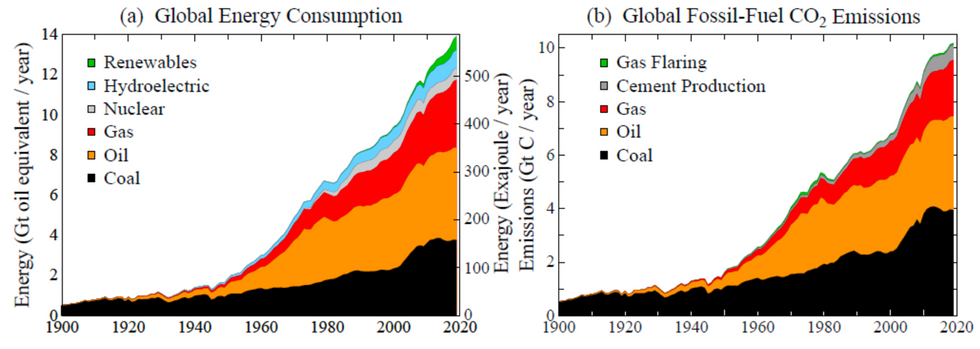
Global energy consumptions vs fossil-fuel emissions
Your progress reflects well on your parliamentary democracy. My wife and I were fortunate to witness the efforts of UK citizens and political leaders during the past two decades as that progress was achieved. It is our fervent hope that the UK will continue to provide leadership and affect the entire planet.
The UK is a special place, but it is not an island unto itself. British citizens will feel all the momentous changes to our planet's atmosphere and suffer the blows from changing climate, should we fail to alter our course.
Our future will be determined by the changes to the global atmosphere. The most relevant change is the increasing amount of atmospheric carbon dioxide (CO2), which is driven by growing global energy consumption and resulting fossil fuel CO2 emissions.
Global energy use and emissions – still being tabulated – declined in the past year, but high emissions will continue unless decisive action informed by science is undertaken. Specifically, the science reveals that to stem the climate tide we need to phase out fossil fuel emissions by mid-century at the latest and obtain our energy from carbon-free sources such as renewable energy and nuclear power.
This may seem to be a tall order, but in fact it is doable. The required actions make sense for many reasons – our economic well-being, human health, and the future of young people and all life on the planet. The required actions are not painful – they will be beneficial, and they will increase social justice.
You may ask: what is the role of the UK in this? We are a small nation with negligible emissions on a global scale. We have little to do with the matter.
A historical role in climate-changing emissions
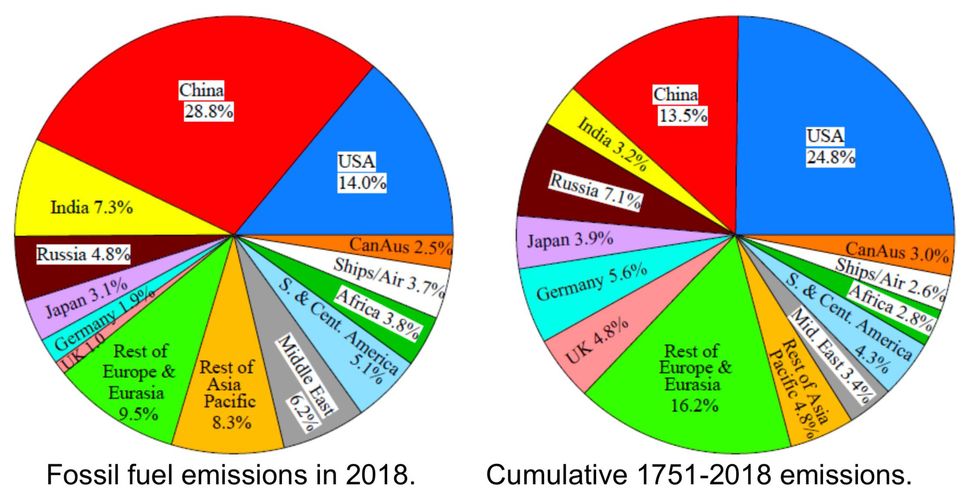
Contemporary vs. historical carbon emissions
In fact, the UK has much to do with the situation that we find ourselves in. And the UK has the potential to play a major role in rectifying the situation and leading the world to a brighter future.
Current and historical emissions are compared in the pie charts above. The UK accounts for about 1 percent of global emissions today, but global warming is proportional to cumulative emissions. The UK is responsible for about 5 percent of total emissions. UK and U.S cumulative emissions are each a factor of five larger than our respective portions of global population.
Our large energy use served a good purpose: It raised our standards of living. But in recent decades the climate situation has emerged with clarity. We must find a new energy path in the mature economies and cooperate with emerging economies, so they can raise living standards with clean carbon-free energies.
Increasing global emissions
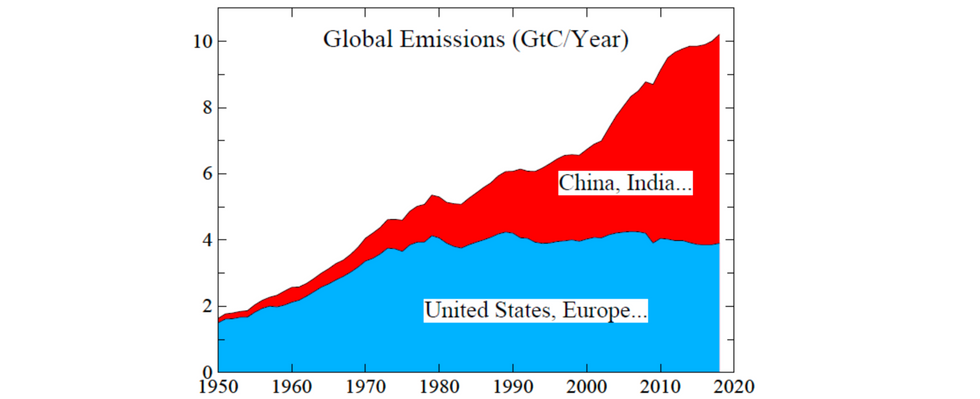
Fossil fuel emissions of mature (blue) and emerging (red) economies
The chart above summarizes the global situation. It shows fossil fuel emissions of mature (blue) and emerging (red) economies. Despite subsidies of renewable energy, global emissions increased. Despite the current health pandemic, high energy demand continues and energy growth will reemerge. However, an effective response to climate change requires that global emissions decline rapidly in the next few decades.
Young people are becoming increasingly sophisticated in their understanding. In the US, student government presidents at more than 350 colleges agreed to a bipartisan statement that they want our government to follow the science – climate, energy, and economics – and adopt a carbon fee & dividend policy.
That policy is dictated by science. Students were informed by their professors, who pointed to a joint resolution of 3,500 economists. In support of the young people, my colleague Daniel Miller and I wrote an op-ed explaining why fee & dividend is the socially and environmentally just way to fight climate change.
The economic fact is that an economy is most efficient if prices are honest. As long as the price of fossil fuels does not include the costs to society, people suffer for the sake of fossil fuel industry profits. The way to rectify this is a rising carbon fee collected at the domestic mine or port of entry, with 100 percent of the funds distributed uniformly to legal residents.
Fee & dividend as solution
Economic studies show that fee & dividend is the fastest way to drive down fossil fuel use while spurring innovation, clean energies and energy efficiency. And it is cost-free. In fact, it increases prosperity and government revenues.
It is socially just, anti-regressive. Seventy percent of the public comes out ahead. Most wealthy people – with larger carbon footprints from more travel, larger dwellings, and so on – will lose money, but they can afford it.Economists agree that a carbon fee or tax is the easiest climate policy to make global. Once a major economic power has adopted it, it can be made near-global via border duties on products from countries without a carbon tax, thus encouraging widespread adoption of a carbon fee.
Why has such a policy not been adopted in the United States? Many congresspeople in the US are well-oiled, coal-fired and full of gas. Fee-and-dividend scares the bejesus out of the fossil fuel industry. But it need not be their kryptonite, because far-thinking companies can retool and invest in both carbon-free energy and negative emissions technologies.
The need for a leader
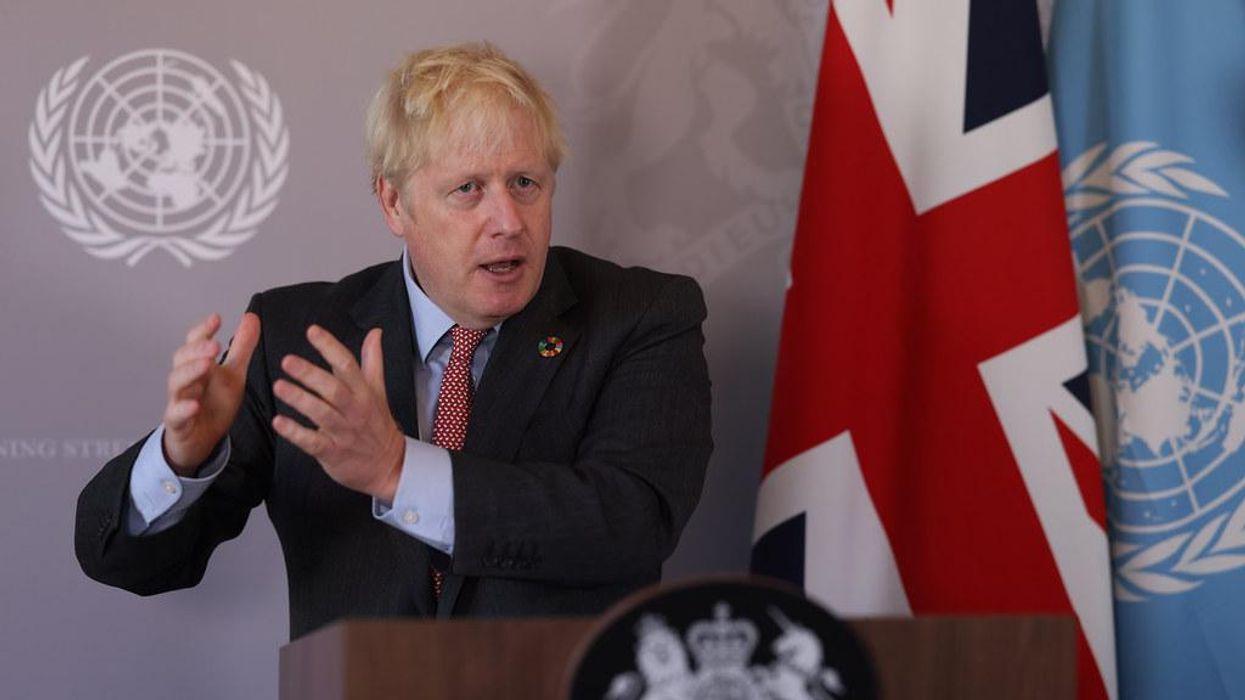
Andrew Parsons / No 10 Downing Street
Thus, one leader with the courage to take on the special interests could change the world's energy course and alter the future for young people and other life on the planet. Where may we find such a leader?
I note that there is a Citizens Climate Lobby (CCL-UK) group in the UK that advocates this policy. I am sure that the leader, James Collis, would be glad to work with your team on the fee & dividend approach (which they term "climate income").
There are also UK citizen climate leaders that are demanding an honest accounting of the climate impacts of government decision-making, including investments in energy projects. Towards this end, I am certain that Tim Crosland, director of Plan B.Earth, would be willing to work with your team.
Prime Minister Johnson, your actions and decisions now will either establish or undermine your claim to climate leadership. The upcoming UN climate conference will be an excellent venue for you to display your commitment.
I will attend that conference with my legal advisor, Daniel M. Galpern. If we can be of any assistance to your climate team in these matters, we would be pleased to help.Thank you for your consideration.
Yours sincerely,
James E. Hansen
James Hansen is the former director of NASA's Goddard Institute for Space Studies. He is an adjunct professor at Columbia University's Earth Institute, where he directs the Program on Climate Science, Awareness and Solutions.
He is also representing his granddaughter as well as "future generations" as plaintiffs in Juliana v. United States, a lawsuit against the United States government for failing to protect a stable climate system.
You can sign up for Hansen's monthly global temperature updates here and Hansen's other communications here. He's also on Twitter: @DrJamesEHansen.
Banner photo: Prime Minister Boris Johnson in his office in Number 10 speaks to President of the European Commission. (Credit: Andrew Parsons / No 10 Downing Street)














